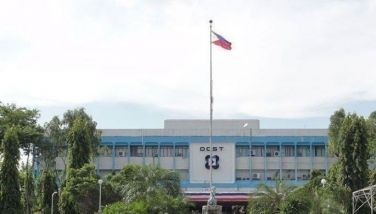BSP expects inflation to slow further in H2
July 30, 2005 | 12:00am
The Bangko Sentral ng Pilipinas (BSP) said yesterday it expects inflation to slow further in the second half of the year due to expectations that food prices will remain stable for the rest of the year on the back of improved agricultural production.
For July, consumer prices probably rose 6.5 percent to seven percent, down from the 7.6-percent inflation rate recorded in June which was the slowest rate in nine months.
For the first half, inflation averaged 8.3 percent, exceeding the BSP’s 7.9-percent forecast for the year.
BSP Governor Amando Tetangco Jr. said the "lower inflation forecast is due mainly to lower food prices following favorable weather and frontloading of rice imports."
Slowing inflation will give the BSP more room to keep interest rates low, helping President Arroyo spur investment in the country.
The BSP on Thursday left its key overnight borrowing rate at seven percent, having raised it a quarter point from a 13-year low in April.
"Inflation in the next six months will be basically lower than 7.9 percent,’’ Deputy Governor Diwa Guinigundo said yesterday without citing figures.
Guinigundo said the 7.9-percent inflation forecast reflects assumptions that the value-added tax (VAT) will be implemented next month and by January 2006, the rest of the VAT reform law will be fully implemented.
The higher inflation target, Guinigundo said, has prompted the MB to keep the BSP’s policy rates steady. But he said indication for July inflation is that it would be lower than the 7.6 percent rate recorded in June.
However, BSP director for economic research Edith Alido said there are indicators that show inflation rate targets for this year could be exceeded.
On the supply side, Alido said the continued price volatility of oil and other energy-related commodities will remain the main factor for the increase in consumer prices.
"The cost side pressures are expected to push the future inflation path upward in the short term," she said.
On the demand side, Alido said the overall output condition still indicates some slack on the economy.
The BSP official said oil prices are likely to remain high in the foreseeable future due to a strong demand from the US and China.
Futures prices indicate that world oil prices may remain high in the near term. Based on BSP’s projection, oil prices based on Dubai crude will average $49.90 in 2005 and $53.47 in 2006 and $52.31 in 2007.
The political crisis surrounding President Gloria Macapagal Arroyo could dampen consumer spending in the Philippines and lead to slower economic growth if it festers for some time, a quarterly Reuters poll has found.
High oil prices, which are likely to continue through 2006, would further dim growth prospects next year, economists said, although remittances from overseas Filipino workers and foreign investments in the mining sector would be positive factors.
The median forecast of 10 economists was for growth of 4.8 percent in 2005 and 4.5 percent in 2006, as growth moderates from 2004’s pace of 6.1 pct – the fastest in 15 years. The 2005 forecast was unchanged from the last Reuters poll in May.
The government expects growth of 5.3 percent this year, but analysts said the political crisis —– Mrs. Arroyo is battling allegations she stole the 2004 presidential elections and of graft involving her family – would weigh.
"The longer it drags on, the greater the likelihood that the Philippines’ growth prospects will lag behind regional peers," said Song Seng Wun of G.K. Goh Securities in Singapore.
The political uncertainty and a court freeze on an expanded sales tax prompted all three major credit rating firms to cut their outlooks on the Philippines to negative earlier this month.
Consumer spending remains buoyant despite rising commodity, transport and electricity prices, as it is supported largely by remittances from more than eight million Filipinos working overseas – about a 10th of the country’s 85 million population.
"The risk here is that the current political uncertainty continues and thus dents household sentiment, which has historically tended to be fairly immune from such shocks," JPMorgan Chase said in a recent report.
An early start to the rainy season should see the farm sector, which accounts for a fifth of GDP, recover after drought ravaged crops in the first quarter.
A surge in mining investment after the Supreme Court opened the sector to foreigners last December, should boost growth next year, said Jose Mario Cuyegkeng, economist at ING Bank in Manila.
For July, consumer prices probably rose 6.5 percent to seven percent, down from the 7.6-percent inflation rate recorded in June which was the slowest rate in nine months.
For the first half, inflation averaged 8.3 percent, exceeding the BSP’s 7.9-percent forecast for the year.
BSP Governor Amando Tetangco Jr. said the "lower inflation forecast is due mainly to lower food prices following favorable weather and frontloading of rice imports."
Slowing inflation will give the BSP more room to keep interest rates low, helping President Arroyo spur investment in the country.
The BSP on Thursday left its key overnight borrowing rate at seven percent, having raised it a quarter point from a 13-year low in April.
"Inflation in the next six months will be basically lower than 7.9 percent,’’ Deputy Governor Diwa Guinigundo said yesterday without citing figures.
Guinigundo said the 7.9-percent inflation forecast reflects assumptions that the value-added tax (VAT) will be implemented next month and by January 2006, the rest of the VAT reform law will be fully implemented.
The higher inflation target, Guinigundo said, has prompted the MB to keep the BSP’s policy rates steady. But he said indication for July inflation is that it would be lower than the 7.6 percent rate recorded in June.
However, BSP director for economic research Edith Alido said there are indicators that show inflation rate targets for this year could be exceeded.
On the supply side, Alido said the continued price volatility of oil and other energy-related commodities will remain the main factor for the increase in consumer prices.
"The cost side pressures are expected to push the future inflation path upward in the short term," she said.
On the demand side, Alido said the overall output condition still indicates some slack on the economy.
The BSP official said oil prices are likely to remain high in the foreseeable future due to a strong demand from the US and China.
Futures prices indicate that world oil prices may remain high in the near term. Based on BSP’s projection, oil prices based on Dubai crude will average $49.90 in 2005 and $53.47 in 2006 and $52.31 in 2007.
High oil prices, which are likely to continue through 2006, would further dim growth prospects next year, economists said, although remittances from overseas Filipino workers and foreign investments in the mining sector would be positive factors.
The median forecast of 10 economists was for growth of 4.8 percent in 2005 and 4.5 percent in 2006, as growth moderates from 2004’s pace of 6.1 pct – the fastest in 15 years. The 2005 forecast was unchanged from the last Reuters poll in May.
The government expects growth of 5.3 percent this year, but analysts said the political crisis —– Mrs. Arroyo is battling allegations she stole the 2004 presidential elections and of graft involving her family – would weigh.
"The longer it drags on, the greater the likelihood that the Philippines’ growth prospects will lag behind regional peers," said Song Seng Wun of G.K. Goh Securities in Singapore.
The political uncertainty and a court freeze on an expanded sales tax prompted all three major credit rating firms to cut their outlooks on the Philippines to negative earlier this month.
Consumer spending remains buoyant despite rising commodity, transport and electricity prices, as it is supported largely by remittances from more than eight million Filipinos working overseas – about a 10th of the country’s 85 million population.
"The risk here is that the current political uncertainty continues and thus dents household sentiment, which has historically tended to be fairly immune from such shocks," JPMorgan Chase said in a recent report.
An early start to the rainy season should see the farm sector, which accounts for a fifth of GDP, recover after drought ravaged crops in the first quarter.
A surge in mining investment after the Supreme Court opened the sector to foreigners last December, should boost growth next year, said Jose Mario Cuyegkeng, economist at ING Bank in Manila.
BrandSpace Articles
<
>
- Latest
- Trending
Trending
Latest
Trending
Latest
Recommended





























